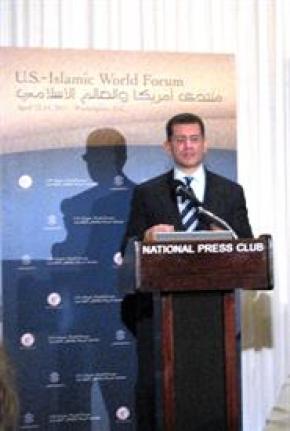ID :
174907
Tue, 04/12/2011 - 14:04
Auther :
Shortlink :
https://www.oananews.org//node/174907
The shortlink copeid
US-Islamic World Forum to kick-off for first time in US

By Sherouq Sadeqi
WASHINGTON, April 12 (KUNA) -- The Eighth Annual US-Islamic World Forum will kick-off for the first time in the US on Tuesday, and comes at a "pivotal" moment in the relations between the US and Islamic world.
The three-day forum, which is a partnership of the Saban Center for Middle East Policy at the Brookings Institution and the Government of Qatar, will host leaders from the US and over 30 Muslim-majority countries, including Egypt, Tunisia, Jordan, Lebanon, Saudi Arabia, Afghanistan, Pakistan, Indonesia, Nigeria, and Sudan.
In an exclusive statement to KUNA, Senior Fellow and Director of the Saban Center for Middle East Policy at Brookings Kenneth Pollack said that the forum was founded "to try and help bridge the difference between the US and Islamic world, and, obviously, one forum each year can't overcome all of the problems." The forum "has begun to make a difference and we are hopeful that, this year, we will have a much bigger difference; a much bigger impact ." He also indicated that the forum in Washington D.C. will have a "tremendously high level of representation from the Islamic world and from the US." "This forum comes at a particular moment. The Arab world is in a state of incredible transformation, and many Americans are trying to come to grips with it," he remarked.
"I don't think most Americans really know what to make of what is going on in the Muslim world, and we're hoping that this three-day conference will help a lot of Americans to understand what needs to happen there and help Americans to feel comfortable about helping that process." "It is going to be a very interesting three days, because we are going to deal with the big issues, such as democratization, change, Muslims in America. These are really huge issues that divide the two parts of the world," he noted.
"We are also going to deal with some of the important specific problems that divide us, such as the Arab-Israeli conflict, what to do about Pakist an and Afghanistan, Iraq, Egypt; all these very specific problems that also tend to drive us away," he noted.
He stressed that "the hope is that by dealing with both the small and the large problems, both sides will begin to understand what the other side needs and what they're willing to do." "That's where compromise comes in, and in particular at this moment in time when what is going on in the Arab world is so unbelievable but it is also uncertain." Pollack said, "we have seen revolutions; we have seen calls for change." "Revolutions can go right and democratic transitions can come off the rails and the outside world, particularly the US, needs to help all those changes head in the right direction and make sure they turn out well ... So we are very hopeful that this conference coming at this incredible moment is going to help both worlds make sure that what is going on in the Islamic world turns out the way that the people of the Muslim world want it to," he affirmed.< BR>The figure then termed the unrest in the Arab world as "inevitable." "I think we have seen Arabs angry and frustrated with their situation for decades ... I wish that the demands and needs of so many Arabs could have been met long ago in a much more peaceful fashion ... (but now,) instead of a gradual peaceful control change, we are seeing sudden unpredictable explosive change," he remarked.
"We are now riding the tiger and the best thing we can do is hang on and try to guide it in the right direction to make sure that this comes out as well as it possibly can for us and for all the people in the Arab world," Pollack told KUNA.
Vice President and Director for Foreign Policy at Brookings Martin Indyk said, in a statement, that "with the winds of change sweeping across the Arab world, the forum convenes in Washington for the first time at a critical moment for US-Muslim relations." "This is a unique and unprecedented opportunity for a substantive dialogue between repr esentatives of the US and Muslim-majority nations and communities, " Indyk remarked.
Among speakers at the forum are US Secretary of State Hillary Clinton, Qatar's Assistant Foreign Minister for Follow-Up Affairs Mohammed Al-Rumaihi, Secretary General of the Organization of the Islamic Conference (OIC) Ekmeleddin Ihsanoglu, Qatar's Minister of State for Foreign Affairs Ahmad bin Abdullah Al-Mahmoud, and Jordan's Foreign Minister Nasser Judah.
The forum will explore critical issues impacting the US and Muslim world engagement. A session will discuss the Obama Administration's Engagement with the Muslim World, besides other sessions that will focus on key issues such as American-Muslim relations aimed at fostering collaborative solutions to common problems such as job creation, economic expansion, education reform, and democracy development.





